Rachel Neumeier's Blog, page 27
November 6, 2024
Mathematicians Tackle Plotting
Actually, one mathematician: Ben Orlin, of Math With Bad Drawings: Mathematical Plot Devices.
He made me laugh with this one:

Technically this should be called a “love angle,” and “love triangle” should be reserved for situations where the two suitors are also in love with each other.
And that’s why I laughed. Of course he’s right! Unless you add the bottom line, you don’t have a TRIANGLE! All you have is an ANGLE! I’m still laughing. It almost makes me want to write a story with an ACTUAL love triangle.
If you’ve got a minute, click through and admire the other plot structures reimagined in mathematical terms.
Please Feel Free to Share:






The post Mathematicians Tackle Plotting appeared first on Rachel Neumeier.
Poetry Thursday: Climbing Stork Tower
Dēng Guànquè
Lóu
Climbing Stork Tower
by Wang Zhihuan (688-742)
When the sun shines over the mountains
As the Yellow River flows to the sea.
If one wants a better view,
(Wants to see a thousand miles)
Climb another floor.
***
Báirì yī shān jǐn,
Huánghé rù hǎiliú.
Yù qióng qiānlǐ mù,
Gèng shàng yī céng lóu.
Here’s an image you might like to go with this poem.
Wikipedia has only a short entry on Wang Zhihuan:
Wang Zhihuan was a Chinese poet of the Kaiyuan era of Emperor Xuanzong of Tang. He is best known for his jueju “Climbing Stork Tower.”
No collection of Wang’s poems seems to have been made. Only six of his poems survive, all of which are quatrains, but almost every one has become a minor classic.
Please Feel Free to Share:






The post Poetry Thursday: Climbing Stork Tower appeared first on Rachel Neumeier.
Out at Patreon: SC#2: Rising Winds
Now available over at Patreon: Silver Circle 2: Rising Winds

WHEW!
Didn’t quite make it by the Day of the Dead, but didn’t miss it by a lot! Plus this is two and a half weeks before the book goes live on Amazon, which isn’t bad. I’d better create a newsletter next week to be sure everyone knows SC#2 is available at Patreon.
Cliffhanger for SC#2 — I think the cliffhanger is not bad at all for Part 2. It’s not that anything resolves, but this part of the story ends at a good place nevertheless. Early readers might weigh in on this.
The last, the very last proofreader, was Linda S., who caught at least three minor continuity bobbles and 26 more unique typos. My favorite, in a sense, was “edged” when the word should have been “etched.” Number of people who missed that: everyone else, including Linda the first time through, my mother twice, and me at least three times. I just thought you might find that amusing, in a weird “How is that possible?” way.
If I can send SC#3 to early readers next week — I THINK I CAN — then I can take a break for about two days and write then next bit of “Midwinter” for the newsletter, which will be nice.
I’ll be doing my VERY BEST to get SC#3 out before Christmas. I mean out at Amazon before Christmas, which of course means WELL before Christmas at my Patreon.
Please Feel Free to Share:






The post Out at Patreon: SC#2: Rising Winds appeared first on Rachel Neumeier.
November 5, 2024
And now for something truly surreal
I’m sure you’re dying to take a look at a classic novel, except without the distracting words. Here is Stevenson’s The Strange Case of Dr. Jekyll and Mr. Hyde, but just the punctuation
I’ll just present the first bit here:
. ; , ; ; , , , . , , ; , – , . ; , ; , . ; , , ; . ” ‘ , ” : ” . ” , . , , . . ; , – . – ; ‘ . ; , , , . , . , , – . , , . , , . , , , , , . – . , . , , ; , . , , , ; , – , , . , ; . ; , ; , . , , . ; ; ; , . . – ; , . ” ? ” ; , ” , ” , ” . ” ” ? ” . , , ” ? ” ” , , ” . : ” , ‘ , . — — , — — . , : , . , , ; ; ‘ . , . ‘ ; . , , , . , , . ‘ ; , , . , , , ; . . . ‘ , . ‘ . , , . , , ; , . , ; , . . , . , , . ; , — — , — — , , . ‘ , ‘ , ‘ . , ‘ . ‘ . ‘ , ‘ ; ; , . ; ? — — , , ‘ , ‘ , ‘ , . ; . , , , ‘ . . ‘ , ‘ , ‘ . ‘ , , ‘ , , ; , , . , . . . ” ” – ! ” . . ” , ” . . ” , ‘ . , ; , , ( ) . , ; . , . , , , ” , . . : ” ‘ ? ” ” , ‘ ? ” . . ” ; . ” ” — — ? ” . . ” , ; , ” . ” ; . , ‘ . ; , ; ( ) . , : , . ” ” , , ” . ” , ” . . ” . , , , . ; ; ‘ . ; . ‘ ; , ‘ . ” ; ” , ” . , ” ‘ . ” ” , , ” . ” , ” , ” ‘ . . ” ” , ” . , ” ‘ . . ” ” , ” . . ” ? ” ” . ; , – . , . ; , ‘ . ‘ , . , ; ; ‘ . ‘ ; . ” . . ”
There you go! The novel, sort of, in the sense of totally not the novel at all.
***
In order to be fair, let’s do now do the reverse by looking at an excerpt from a novel where the author was just too cool to bother putting in (most of) the punctuation; eg, this:
When it was light enough to use the binoculars he glassed the valley below. Everything paling away into the murk. The soft ash blowing in loose swirls over the blacktop. He studied what he could see. The segments of road down there among the dead trees. Looking for anything of color. Any movement. Any trace of standing smoke. He lowered the glasses and pulled down the cotton mask from his face and wiped his nose on the back of his wrist and then glassed the country again. Then he just sat there holding the binoculars and watching the ashen daylight congeal over the land. He knew only that the child was his warrant. He said: If he is not the word of God God never spoke. When he got back the boy was still asleep. He pulled the blue plastic tarp off of him and folded it and carried it out to the grocery cart and packed it and came back with their plates and some cornmeal cakes in a plastic bag and a plastic bottle of syrup. He spread the small tarp they used for a table on the ground and laid everything out and he took the pistol from his belt and laid it on the cloth and then he just sat watching the boy sleep. He’d pulled away his mask in the night and it was buried somewhere in the blankets. He watched the boy and he looked out through the trees toward the road. This was not a safe place. They could be seen from the road now it was day. The boy turned in the blankets. Then he opened his eyes. Hi, Papa, he said. I’m right here. I know. An hour later they were on the road. He pushed the cart and both he and the boy carried knapsacks. In the knapsacks were essential things. In case they had to abandon the cart and make a run for it. Clamped to the handle of the cart was a chrome motorcycle mirror that he used to watch the road behind them. He shifted the pack higher on his shoulders and looked out over the wasted country. The road was empty. Below in the little valley the still gray serpentine of a river. Motionless and precise. Along the shore a burden of dead reeds. Are you okay? he said. The boy nodded. Then they set out along the blacktop in the gunmetal light, shuffling through the ash, each the other’s world entire.
Recognize that? Probably you do! That’s a bit of The Road by Cormac McCarthy, which as you probably know won the Pulitzer, because there’s no better way to show off your brilliance as an author than to leave out 90% of the punctuation, that’s what I always say.
To be fair, I did read The Road and sort of liked it, though it is almost unrelentingly grim.
***
While on this theme, how about House of Leaves by Mark Z. Danielewski?
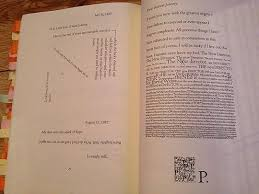
”Simultaneously reads like a thriller and like a strange, dreamlike excursion into the subconscious,” says Michiko Kakutani of The New York Times, and I’m willing to believe it. If you click through, by the way, and scan about a third of the way through the sample, that’s where things start getting really peculiar.
Here’s a review: ‘House of Leaves’ is a terrifying masterpiece
Throughout the story, Johnny recounts his misadventures with sex, drugs and alcohol, like a teenager who just learned what intercourse is. His prose is juvenile and his exploits egotistical, eventually culminating in a section that warrants a trigger warning as his mental state begins to unravel. But as you dive deeper into his story and learn about his mentally ill mother, the full picture comes together. Although it took time, I began to feel for Johnny and his dysfunction, hoping he would get out of the hole he keeps digging for himself.
Perhaps this leads to the most widely recognizable aspect of the story — its bizarre structure. At first the abstractions are small. The word “house” appears in blue ink every time it appears (including on the cover), and different narrators are denoted by different fonts – Courier New for Johnny, Times New Roman for Zampanò. Whole passages appear upside down and backward, stretching all over the page and forcing the reader to physically engage. At one point, readers have to decode a letter.
While this may seem like a chore, to those who are willing to put in the effort, they are presented with a rich mystery that forces readers to dig deep to interpret it. It took me a little under two years to finish the book, but as I stuck with it, I found myself being sucked into its terrifying world more than I had with any other book. Upon completing it in 2019, I couldn’t stop thinking about it.
Does not sound like anything I will ever actually read, because I’m willing to be entertained by weird use of fonts and text effects, but I can hardly imagine a protagonist I would dislike more, and I don’t care about the full picture. Also, a lot of reviews do say “terrifying” and “sticks with you” and the combination does not sound at all appealing.
***
Here’s something a lot more fun: The Illuminae trilogy by Kaufman and Kirstoff.
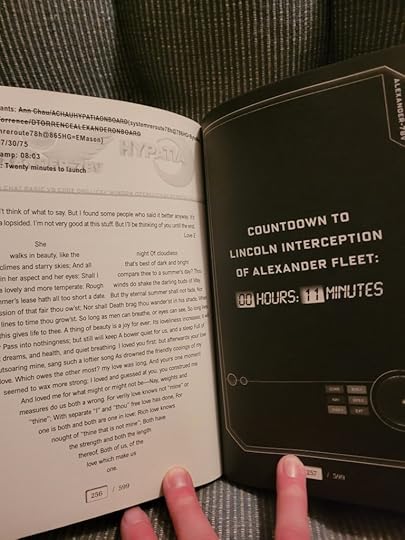

And, I mean, most of the pages aren’t this extreme, but I didn’t have to flip through the book very long to find great examples of weird pages. Zero pages are just normal text. That’s because this is an epistolary story, told in texts, emails, letters, ascii art, memos, and so forth. With expletives blanked out because these documents are being entered in a court record in the frame story. There is an audiobook version, which strikes me as tremendously bizarre. I can’t imagine how the narrator would handle pages like the above. I’m not willing to pay money to get the audiobook and find out, but I do wonder.
Regardless, I loved this trilogy, which is a lunatic ride involving insane computers, zombie hordes, brain-eating parasites, elite assassins, an unbelievably evil corporation — adverb chosen after judicious consideration — crazy parallel universe moments, and most of all a lot of uber-competent teenagers heroically saving the day. Did I mention I loved this trilogy? It’s huge fun. With a happy ending, in case you occasionally have doubts.
Please Feel Free to Share:






The post And now for something truly surreal appeared first on Rachel Neumeier.
November 4, 2024
Neat book covers
These are horror book covers because I happened to see a couple I liked in quick succession. I already had several posts set up for Halloween, so whatever, let’s look at these even though it’s now November.
Here, check this out:

And, I didn’t realize this when I picked out this cover, but at the time I’m writing this post, the book is just $1.99 on Kindle, which I admit does make me want to take a close look at it. The cover caught my eye first just because I think it’s neat — understated, evocative, clever, plainly horror without being seriously off-putting. I mean for me. My tolerance for horror is only medium, but sometimes I like it. I prefer to know going in that there’s a happy ending, or adequately happy, anyway.
Here’s the description:
At the dawn of the twentieth century in Paris, Samantha Harker, daughter of Dracula’s killer, works as a researcher for the Royal Society for the Study of Abnormal Phenomena. But no one realizes how abnormal she is. Sam is a channel into the minds of monsters: a power that could help her solve the gruesome deaths plaguing turn-of-the-century Paris—or have her thrown into an asylum.
Sam finds herself assigned to a case with Dr. Helena Moriarty, daughter of the criminal mastermind and famed nemesis of Sherlock Holmes and a notorious detective whom no one wants to work with on account of her previous partners’ mysterious murders. Ranging from the elite clubs of Paris to the dark underbelly of the catacombs, their investigation sweeps them into a race to stop a Beast from its killing rampage, as Hel and Sam are pitted against men, monsters, and even each other. But beneath their tenuous trust, an unmistakable attraction brews. Is trusting Hel the key to solving the murder, or is Sam yet another pawn in Hel’s game?
I’m not actually a big fan of either Dracula OR Sherlock Holmes. Still, it does sound intriguing.
Here’s another:
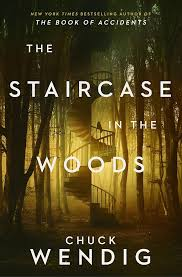
Though I sometimes glance at his blog — Wendig can be hilarious — I didn’t get far when I tried one of his books. I can’t remember which. I do remember that I didn’t like the characters as they were presented in the first chapter, and that’s as far as I got.
But this, The Staircase in the Woods, presents a great cover and a fantastic description:
Five high school friends are bonded by an oath to protect one another no matter what. Then, on a camping trip in the middle of the forest, they find something extraordinary: a mysterious staircase to nowhere. One friend walks up—and never comes back down. Then the staircase disappears.
Twenty years later, the staircase has reappeared. Now the group returns to find the lost boy—and what lies beyond the staircase in the woods. . . .
This is an interesting description because it’s so very minimal, and so very catchy. It hits elements that really appeal to me — friendship, loyalty. It’s also a lot like the basic structure of King’s It, of course.
The mystery sounds super intriguing. It’s not out yet — it comes out April 2025 — so there aren’t any reviews at Amazon. But there are at Goodreads! So what do Goodreads reviewers say? Luckily, I don’t see anyone saying, “Here, let me lay out the entire plot in detail because heaven forbid the reader be surprised by the plot twists!” I do see some comments that are a bit of a turnoff, about betrayal and broken trust, for example. Two reviews I glanced at mention “politics,” apparently meaning current-day modern politics are important? There is probably nothing I want to read about less. That’s not going to change between now and April, either.
You know what — this cover and the description actually make me want to write the story myself. Without any reference to Wendig’s story, I mean. I don’t expect it will ever happen, but I feel an urge to do something with this. Maybe someday.
Okay, after seeing these, I went looking for other recent horror novels I might really like to read, and here’s a possibility:
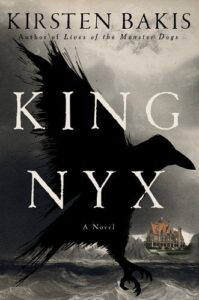
This one, King Nyx, has a lot of editorial reviews, a relatively poor star rating — 4.0 on Amazon — and features Charles Fort and, as the protagonist, his wife, Anna Fort.
Anna Fort wants to be a supportive wife, even if that means accompanying her husband for the winter of 1918 to a remote, frozen island estate so he can finish his book as the guest of an eccentric millionaire. When she learns three girls are missing from a school run by their host, Anna realizes finding them is up to her—even if that means risking her husband’s career, and possibly her life.
Her husband’s masterpiece-in-progress features strange meteorological anomalies along with wild speculations about “facts” he believes scientists hide from the public. Most people think Charles Fort is a crackpot. That’s about to change now that wealthy Claude Arkel is his patron.
Yet Anna is sure something’s not right on Prosper Island, though the alarming return of her “troubles” makes her question her own sanity. Is the figure in the woods really the ghost of her long-lost friend Mary, or a product of her disturbed imagination? Accompanied reluctantly by a fellow guest, the elegant and troubled Stella Bixby, Anna embarks on a dangerous quest to find the missing girls before Arkel finds her—or her own mind unravels.
Charles Fort was an interesting person, whom I heard about via a long out-of-print book called Charles Fort Never Mentioned Wombats, which is a mystery set at an SF convention, incorporating a lot of in-jokes for fans. It’s a sequel to Now You See It/Him/Them. Oh, here we go — here’s a review by James Nicoll. Anyway, the point is, that’s why I’d heard of Charles Fort and that’s why having Anna Fort as the protagonist in the above novel caught my eye.
Here’s the beginning of King Nyx:
Last night I dreamed my husband came back. He was blurry, like an old sepia photograph, but otherwise looked the way he had in life, tall and with that shy smile hiding under his mustache, happy with some private thought.
“Charles!” I said. He looked up, first surprised to see me, then glad, a little of his smile appearing, like sun peeking from behind a clous. He tried to move toward me, but didn’t seem able to get his feet off the ground.
Then a drop of something splashed on his oval wire-rimmed glasses. Another slid down his forehead. Liquid ran through his hair. The sepia streaks were dark on his skin. Darker than water.
“It’s blood, isn’t it?” I asked in the dream.
He ran a finger across his wet cheek, then held it up to look. A whole smile came out from under his mustache. “Why, so it is!” he said. “Isn’t it wonderful, Anna?”
***
Well, that’s definitely got horror vibes, no question about that. I don’t know if I’ll actually read it, but it’s intriguing.
Please Feel Free to Share:






The post Neat book covers appeared first on Rachel Neumeier.
November 3, 2024
Griffin Mage: Please Move / Write A Review
Okay, so you know what happened today? The new editions of The Griffin Mage trilogy went live on Amazon. They, that is the new editions, do not have ANY reviews or ratings because they are NEW EDITIONS. Amazon does not connect new editions to old, or at least, not when the publisher switches from publisher to author.
Here is The Griffin Mage Trilogy Omnibus, OLD edition, with a fair number of reviews.
Here is Lord of the Changing Winds, OLD edition, with some reviews; and HERE is Lord of the Changing Winds, NEW edition
Here is Land of the Burning Sands, OLD edition, with some reviews, and HERE is Land of the Burning Sands, NEW edition
Here is Law of the Broken Earth, OLD edition, with some reviews, and HERE is Law of the Broken Earth, NEW edition
If you ever wrote a review for any or all of these books, please take a moment to copy these reviews over to the new editions. If you’ve read them, but never wrote a review, this would be a nice time for you to write a review. I would greatly appreciate it! I would like to run a promotion for the new-edition trilogy, but I can’t until there are a reasonable number of reviews. I mean: a lot of promotion sites literally will not accept a book for promotion unless it has some number of reviews.
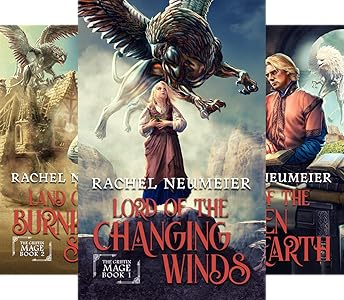
So that’s the first thing! Now, on to the ordinary Monday update:
So, for Silver Circle #3, I have now:
–lightly tweaked chapter one.
–heavily revised chapter two, chapter three, and chapter four.
–lightly revised chapter five, cut in in half, and moved part of it into a new chapter seven
–heavily revised chapter six.
–moved chapters around.
–revised chapter nine.
–written a brand-new chapter ten. I mean, it’s a short chapter. But it wasn’t there and now it is.
–moved chapters around some more.
–revised chapters eleven and twelve.
–overall, I’ve cut 15,000 words and also added 15,000 words, which sometimes happens, I suppose. It is sitting at almost precisely 150,000 words at this point, which means I’ve cut and replaced 10% of the total length. SO FAR. It will definitely get trimmed back at the sentence level, but I will also definitely be adding to it — I still definitely intend to write two scenes, currently absent, and also I need to write chapter 25, which is currently just not there at all, and finish the epilogue. I expect it to arrive at a minimum of 160,000 words eventually. Probably more, given the way everything expands. I will just pause here to note that this means SILVER CIRCLE will most likely go a bit past 400,000 words inclusive, so though it seems to be taking FOREVER to finish, well, that’s why.
REALLY SOON, I should hit at least a few chapters that barely get tweaked, and I have to say, I’m sure looking forward to that. Obviously, I am not ready to send this book to early readers today. Maybe this time next week.
Please Feel Free to Share:






The post Griffin Mage: Please Move / Write A Review appeared first on Rachel Neumeier.
October 31, 2024
Neat idea about seeing what your scenes are doing
Here’s a blog post from Patricia Wrede: The Big Three again
As I learned it, the idea goes something like this: In any book or story, there are three main things a scene can do. 1) It can advance the plot. 2) It can deepen the characterization. 3) It can fill in setting and backstory. A scene that does none of these things does not belong in the book.
… It took me a while to figure out how to tell what a given scene was doing. Once I did, I felt extremely silly, because it is ridiculously simple. You take the scene out, and see what necessary and important links in the story are suddenly missing.
I instantly said, THAT’S BRILLIANT!
How did I never think of that?
I learned this on a cellular level when I was editing my third novel, Talking to Dragons. An editor was interested, but wanted me to cut almost 20,000 words to get it within the then-upper-limit for word count on that type of kid’s book. I started by looking for scenes I could cut, as that seemed like the quickest and easiest way to shrink it by 20,000 words.
I quickly discovered that every time I cut an entire scene, something didn’t make sense. Without this one, the friendship between the two central characters was sudden and inexplicable. Without that one, the little dragon had no reason for avoiding wizards. …
I think this is a really great idea for seeing what a scene is doing AND seeing whether the scene should be there. I think so even though I’m not a purist and I might very well leave a scene in the novel just because it’s neat and doesn’t get in the way. Though as far as that goes, in general “it’s neat” means it’s deepening characterization or developing a relationship. Something, anyway. Nevertheless, yes, I really like this idea of pulling out a scene, or pretending it’s not there, and seeing what else later on suddenly isn’t justified or doesn’t work.
In fact, “justification” is important and sometimes hard to see, I think. I mean situations where a scene, maybe just a little tidbit in a scene, is crucial to set up something later, but the reader naturally can’t tell about that and may point to this scene and say, “I skimmed this, I wasn’t that interested here, this doesn’t seem important.” You can’t cut that scene. The setup, invisible to the reader at that point in the story, is crucial. Therefore, all those critiques actually mean “trim harder to avoid readers getting bored here, but keep enough so that the justification is still there, setting up this important later thing.”
I like this too:
Since then, I’ve seen various hierarchies that try to link these three basic story elements with things like theme, or atmosphere, or structure. To me, those aren’t very helpful. Structure is about how a story is told. Theme is about what the story tries to say, sort of like the morals of Aesop’s fables. Atmosphere is an emergent property of style. None of them are as fundamental to the story itself as the Big Three—plot, characterization, setting-and-backstory.
To me, atmosphere (tone), is really fundamental. So is theme. But I see what Wrede is saying here, though. Atmosphere and theme = will you LIKE the story. The Big Three = does the story WORK, which is not the same thing.
Neat post! I think I’ll try that — I mean thinking about what suddenly fails if a specific scene is removed. I think that could be interesting even if I mostly do everything by feel.
Please Feel Free to Share:






The post Neat idea about seeing what your scenes are doing appeared first on Rachel Neumeier.
October 30, 2024
Out Today: Silver Circle #1
I mean at Amazon, of course! Silver Circle: Scattered Sparks. I did the other Halloween post and just about forgot to mention this one!

Here it goes, and if you have already read it, then I would very much appreciate it if you’d take a minute to leave a review.
Please Feel Free to Share:






The post Out Today: Silver Circle #1 appeared first on Rachel Neumeier.
Cozy Horror
This is a great term for a subgenre that I’ve thought of as “Horror Lite” — Horror, but not too horrific. Horror, but the characters you like have good arcs and don’t die. Someone here suggested T Kingfisher as the defining author for Cozy Horror, and sure, I agree.
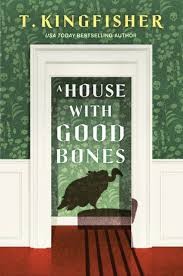
A House With Good Bones is a good example. It’s not very horrific at all. The oddest thing about it — as I said here — is that it’s got a lot of romance beats and then stops short of being a romance. I liked it, though. Also, I literally did read it on Halloween last year, so there’s that.
If you would like some nice cozy horror to read today, then here:
10 Cozy Horror Selections to Read by the Fire
Of the books from this post, the one I most like the sound of is this one:
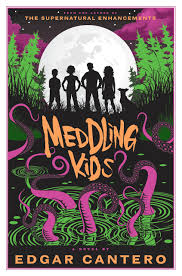
Meddling Kids is described this way:
With raucous humor and brilliantly orchestrated mayhem, Meddling Kids subverts teen detective archetypes like the Hardy Boys, the Famous Five, and Scooby-Doo, and delivers an exuberant and wickedly entertaining celebration of horror, love, friendship, and many-tentacled, interdimensional demon spawn.
SUMMER 1977. The Blyton Summer Detective Club (of Blyton Hills, a small mining town in Oregon’s Zoinx River Valley) solved their final mystery and unmasked the elusive Sleepy Lake monster—another low-life fortune hunter trying to get his dirty hands on the legendary riches hidden in Deboën Mansion. And he would have gotten away with it too, if it weren’t for those meddling kids.
1990. The former detectives have grown up and apart, each haunted by disturbing memories of their final night in the old haunted house. There are too many strange, half-remembered encounters and events that cannot be dismissed or explained away by a guy in a mask. And Andy, the once intrepid tomboy now wanted in two states, is tired of running from her demons. She needs answers. To find them she will need Kerri, the one-time kid genius and budding biologist, now drinking her ghosts away in New York with Tim, an excitable Weimaraner descended from the original canine member of the club. They will also have to get Nate, the horror nerd currently residing in an asylum in Arkham, Massachusetts. Luckily Nate has not lost contact with Peter, the handsome jock turned movie star who was once their team leader . . . which is remarkable, considering Peter has been dead for years.
The time has come to get the team back together, face their fears, and find out what actually happened all those years ago at Sleepy Lake. It’s their only chance to end the nightmares and, perhaps, save the world.
This sounds delightful and I immediately downloaded a sample, though I don’t expect I’ll have time to read it this Halloween.
But hopefully YOU will all read some nice not-too-horrific novel this Halloween!
 Please Feel Free to Share:
Please Feel Free to Share:







The post Cozy Horror appeared first on Rachel Neumeier.
Poetry Halloween: Darkness
I had a dream, which was not all a dream.
The bright sun was extinguish’d, and the stars
Did wander darkling in the eternal space,
Rayless, and pathless, and the icy earth
Swung blind and blackening in the moonless air;
Morn came and went–and came, and brought no day,
And men forgot their passions in the dread
Of this their desolation; and all hearts
Were chill’d into a selfish prayer for light:
And they did live by watchfires–and the thrones,
The palaces of crowned kings–the huts,
The habitations of all things which dwell,
Were burnt for beacons; cities were consumed,
And men were gather’d round their blazing homes
To look once more into each other’s face;
Happy were those who dwelt within the eye
Of the volcanos, and their mountain-torch:
A fearful hope was all the world contain’d;
Forests were set on fire–but hour by hour
They fell and faded–and the crackling trunks
Extinguish’d with a crash–and all was black.
The brows of men by the despairing light
Wore an unearthly aspect, as by fits
The flashes fell upon them; some lay down
And hid their eyes and wept; and some did rest
Their chins upon their clenched hands, and smiled;
And others hurried to and fro, and fed
Their funeral piles with fuel, and look’d up
With mad disquietude on the dull sky,
The pall of a past world; and then again
With curses cast them down upon the dust,
And gnash’d their teeth and howl’d: the wild birds shriek’d
And, terrified, did flutter on the ground,
And flap their useless wings; the wildest brutes
Came tame and tremulous; and vipers crawl’d
And twined themselves among the multitude,
Hissing, but stingless–were slain for food.
And War, which for a moment was no more,
Did glut himself again:–a meal was bought
With blood, and each sate sullenly apart
Gorging himself in gloom: no love was left;
All earth was but one thought–and that was death
Immediate and inglorious; and the pang
Of famine fed upon all entrails–men
Died, and their bones were tombless as their flesh;
The meagre by the meagre were devour’d,
Even dogs assail’d their masters, all save one,
And he was faithful to a Gorse, and kept
The birds and beasts and famish’d men at bay,
Till hunger clung them, or the dropping dead
Lured their lank jaws; himself sought out no food,
But with a piteous and perpetual moan,
And a quick desolate cry, licking the hand
Which answer’d not with a caress–he died.
The crowd was famish’d by degrees; but two
Of an enormous city did survive,
And they were enemies: they met beside
The dying embers of an altar-place
Where had been heap’d a mass of holy things
For an unholy usage; they raked up,
And shivering scraped with their cold skeleton hands
The feeble ashes, and their feeble breath
Blew for a little life, and made a flame
Which was a mockery; then they lifted up
Their eyes as it grew lighter, and beheld
Each other’s aspects–saw, and shriek’d, and died–
Even of their mutual hideousness they
Unknowing who he was upon whose brow
Famine had written Fiend. The world was void,
The populous and the powerful was a lump,
Seasonless, herbless, treeless, manless, lifeless,
A lump of death–a chaos of hard clay.
The rivers, lakes, and ocean all stood still,
And nothing stirr’d within their silent depths;
Ships sailorless lay rotting on the sea,
And their masts fell down piecemeal: as they dropp’d
They slept on the abyss without a surge
The waves were dead; the tides were in their grave,
The moon, their mistress, had expired before;
The winds were wither’d in the stagnant air,
And the clouds perish’d; Darkness had no need
Of aid from them–She was the Universe.
–Lord Byron
Please Feel Free to Share:






The post Poetry Halloween: Darkness appeared first on Rachel Neumeier.



